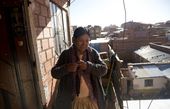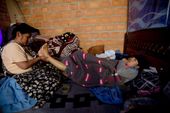Health_Medical_Pharma
Latest Stories

exchange-miracle_dog_90349.jpg
Miracle pokes her head out of a doorway during a visit to nursing home residents Wednesday, July 19, 2017, at St. Elizabeth Nursing Home in Janesville, Wis. (Angela Major/The Janesville Gazette via AP)

exchange-miracle_dog_88986.jpg
ADVANCE FOR RELEASE SATURDAY, AUGUST 5, 2017 Dolores Jones gets a visit from Miracle, a golden retriever who surprised vets by overcoming a disability, on Wednesday, July 19, 2017, at St. Elizabeth Nursing Home in Janesville, Wis. (Angela Major/The Janesville Gazette via AP)

med--fda-hepatitis_c_drug_41947.jpg
This photo provided by AbbVie shows the drug Mavyret. On Thursday, Aug. 3, 2017, the Food and Drug Administration approved Mavyret to treat all forms of hepatitis C. The drug works in as little as eight weeks and is for patients without significant cirrhosis who haven't been treated previously for the liver-destroying virus, plus patients who were not cured by a prior treatment. (Richard Mack/Courtesy of AbbVie via AP)

trump_veterans_16709.jpg
President Donald Trump listens to a presentation by Veterans Affairs Secretary David Shulkin during a Veterans Affairs Department "telehealth" event, Thursday, Aug. 3, 2017, in the Roosevelt Room of the White House in Washington. (AP Photo/Evan Vucci)

trump_veterans_23282.jpg
President Donald Trump, accompanied by Veterans Affairs Secretary David Shulkin talks with a patient during a Veterans Affairs Department "telehealth" event, Thursday, Aug. 3, 2017, in the Roosevelt Room of the White House in Washington. (AP Photo/Evan Vucci)

Trump_Veterans_95452.jpg-0db0a.jpg
President Donald Trump speaks in the Roosevelt Room of the White House in Washington, Thursday, Aug. 3, 2017, during a Veterans Affairs Department "telehealth" event. (AP Photo/Evan Vucci)

trump_veterans_54368.jpg
Veterans Affairs Secretary David Shulkin watches as President Donald Trump talks with a patient during a Veterans Affairs Department "telehealth" event, Thursday, Aug. 3, 2017, in the Roosevelt Room of the White House in Washington. (AP Photo/Evan Vucci)

Trump_Veterans_54368.jpg-f9f3e.jpg
Veterans Affairs Secretary David Shulkin watches as President Donald Trump talks with a patient during a Veterans Affairs Department "telehealth" event, Thursday, Aug. 3, 2017, in the Roosevelt Room of the White House in Washington. (AP Photo/Evan Vucci)

martin_shkreli_trial_78500.jpg
Martin Shkreli, second from left, arrives at federal court in New York, Thursday, Aug. 3, 2017. Jurors are starting their fourth day of deliberations at the federal securities fraud trial of the former pharmaceutical company CEO. (AP Photo/Seth Wenig)

martin_shkreli_trial_47592.jpg
Martin Shkreli arrives to federal court in New York, Thursday, Aug. 3, 2017. Jurors are starting their fourth day of deliberations at the federal securities fraud trial of the former pharmaceutical company CEO. (AP Photo/Seth Wenig)

martin_shkreli_trial_16047.jpg
Martin Shkreli arrives to federal court in New York, Thursday, Aug. 3, 2017. Jurors are starting their fourth day of deliberations at the federal securities fraud trial of the former pharmaceutical company CEO. (AP Photo/Seth Wenig)

martin_shkreli_trial_42704.jpg
Martin Shkreli arrives to federal court in New York, Thursday, Aug. 3, 2017. Jurors are starting their fourth day of deliberations at the federal securities fraud trial of the former pharmaceutical company CEO. (AP Photo/Seth Wenig)

netherlands_euthanasia_61723.jpg
FILE - This is a Tuesday, April 10, 2001, file of thousands of protesters as they demonstrate outside Dutch government buildings at The Hague, Netherlands, as the Upper House of Parliament voted to legalize euthanasia. Dying by euthanasia has become “common practice” in the Netherlands since its legalization a dozen years ago and doctors are now reporting increasing rates of people seeking the practice who aren’t terminally ill, a new review says. (AP Photo/Serge Ligtenberg, File)

bolivia_turning_to_midwives_23857.jpg
In this July 20, 2017 photo, midwife Ana Choque braids her hair after getting home from a prenatal care visit at a patient's home in El Alto, Bolivia. Choque, who began learning midwifery at age 15 from her grandmother, is one of 22 midwives who passed an exam to get qualified by the health ministry as part of a midwifery program within the public health system. (AP Photo/Juan Karita)

bolivia_turning_to_midwives_99293.jpg
In this June 20, 2017 photo, midwife Ana Choque massages the feet of Mariana Limachi two weeks after delivering Limachi's first child at her home in El Alto, Bolivia. Maternal deaths in Bolivia are concentrated among poor, rural indigenous women. Critics say Bolivia's public health centers and hospitals in rural areas often lack beds, doctors and medicines. "An equally important factor is the fact that indigenous women who have managed to get to clinics have often been treated as second-class citizens, scorned because of their gender, their ethnicity and their traditions," the U.N. body said in a 2009 report. (AP Photo/Juan Karita)

bolivia_turning_to_midwives_85898.jpg
In this June 27, 2017 photo, Dr. Milenkha Chavez gives a routine check-up to 21-day-old Abraham Dilan, who was delivered at home by a midwife, as his mother Mariana Limachi stands by at the Franz Tamayo Health Center in El Alto, Bolivia. A midwife training program officially began in 2013 after Bolivia passed a law recognizing traditional indigenous medicine, including midwifery. (AP Photo/Juan Karita)

bolivia_turning_to_midwives_72747.jpg
In this July 20, 2017 photo, midwife Ana Choque poses for a portrait before leaving her home to visit a pregnant patient for prenatal care in El Alto, Bolivia. The 58-year-old midwife learned the trade from her grandmother when she was 15. In the four decades since, she says, she has delivered more than 3,000 babies. (AP Photo/Juan Karita)

bolivia_turning_to_midwives_73936.jpg
In this July 20, 2017 photo, midwife Ana Choque selects medicinal herbs to take to one of her pregnant patients for prenatal care in El Alto, Bolivia. The herbs are, from left: camomile, rosemary, "molle" a kind of pepper, "artemisia" or sagebrush, and "chacataya." (AP Photo/Juan Karita)

aptopix_bolivia_turning_to_midwives_07286.jpg
In this July 20, 2017 photo, midwife Ana Choque poses for a portrait before leaving her home to visit a pregnant patient for pre-natal care in El Alto, Bolivia. Women from the Aymara and Quechua indigenous groups, who make up a majority of Bolivia's population, distrust hospitals and cesarean births, and prefer to rely on traditional midwives who they often refer to as "aunt." (AP Photo/Juan Karita)


